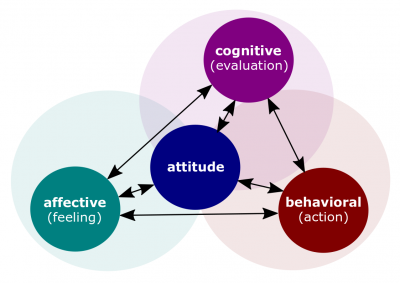Difference between revisions of "Affective attitude"
| (2 intermediate revisions by the same user not shown) | |||
| Line 1: | Line 1: | ||
| − | [[File:Attitude.png|400px|thumb|right|[[Attitude]]]][[Affective component]] is the emotional or feeling segment of an attitude. | + | [[File:Attitude.png|400px|thumb|right|[[Attitude]]]][[Affective attitude]] (alternatively known as [[affective component]]) is the emotional or feeling segment of an [[attitude]]. |
==Definitions== | ==Definitions== | ||
According to [[Organizational Behavior by Robbins and Judge (17th edition)]], | According to [[Organizational Behavior by Robbins and Judge (17th edition)]], | ||
| − | :[[Affective component]]. The emotional or feeling segment of an [[attitude]]. | + | : '''[[Affective component]]'''. The emotional or feeling segment of an [[attitude]]. |
According to [[Management by Robbins and Coulter (14th edition)]], | According to [[Management by Robbins and Coulter (14th edition)]], | ||
| − | :[[Affective component]]. That part of an [[attitude]] that's the emotional or feeling part. | + | : '''[[Affective component]]'''. That part of an [[attitude]] that's the emotional or feeling part. |
According to the [[Marketing Communications by Fill (5th edition)]], | According to the [[Marketing Communications by Fill (5th edition)]], | ||
| − | :[[Affective component]]. Is a part of the attitude construct, and refers to the feelings held about a product, object or person. This is concerned with feelings, sentiments, moods and emotions about an object. | + | : '''[[Affective component]]'''. Is a part of the attitude construct, and refers to the feelings held about a product, object or person. This is concerned with feelings, sentiments, moods and emotions about an object. |
Latest revision as of 18:55, 12 May 2023
Affective attitude (alternatively known as affective component) is the emotional or feeling segment of an attitude.
Definitions
According to Organizational Behavior by Robbins and Judge (17th edition),
- Affective component. The emotional or feeling segment of an attitude.
According to Management by Robbins and Coulter (14th edition),
- Affective component. That part of an attitude that's the emotional or feeling part.
According to the Marketing Communications by Fill (5th edition),
- Affective component. Is a part of the attitude construct, and refers to the feelings held about a product, object or person. This is concerned with feelings, sentiments, moods and emotions about an object.
